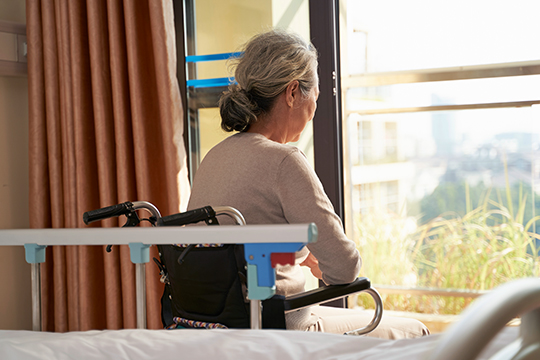
Social isolation among older adults was recognized as a public health issue before the pandemic but frequent lockdowns have had a significant negative impact on the situation.
Social isolation and its impacts on health and well-being and our communities have been the focus of governments, academics, and advocates, including Federal Retirees. Social isolation can happen at any age, but it’s an increasingly pressing issue for older adults in Canada.
The COVID-19 pandemic has been an exceptionally lonely and isolating time. Older Canadians have been disproportionately impacted as a vulnerable population was advised to follow public health measures such as social distancing and isolation to reduce the risk of transmission and severe illness, hospitalization and death.
Media stories and conversations with Association members tell us that this period of isolation has not been easy, and people have struggled.
How we support older Canadians and communities, particularly vulnerable and socially isolated seniors, deserves attention and policy response now more than ever.
What is social isolation?
Social isolation among older adults was recognized as a public health issue prior to the pandemic that has only heightened as a result of COVID lockdowns.
In research, there are several definitions of social isolation. The National Seniors Council of Canada defines social isolation as “a low quantity and quality of contact with others.”
While not the same as loneliness, most agree social isolation and loneliness are related.
Social isolation among older Canadians
In 2020, Statistics Canada released a study about social isolation and mortality among Canadian seniors. Looking at responses from the 2008/2009 Canadian Community Health Survey-Healthy Aging, the researchers found an estimated 525,000 people, or 12 per cent of those aged 65 and older, felt socially isolated.
Social isolation was measured by examining low community participation as well as feelings of loneliness and a weak sense of community belonging. More than one million respondents (24 per cent) reported having participated in community activities less than once a week.
Estimates of low participation between women and men were not significantly different, but women were more likely than men to report feelings of social isolation.
A report by the National Seniors Council in 2014 notes that there are several factors that make older adults more at risk of social isolation, such as living alone, compromised health status, lack of contact with family, living with low income and limited access to transportation, among others.
The report also identified specific groups as being at greater risk of social isolation such as Indigenous seniors, low-income seniors, immigrant seniors, seniors who are caregivers, older adults with physical and mental health issues, and lesbian, gay, bisexual or transgendered seniors.
Experiences of social isolation vary, and not all socially isolated seniors experience negative effects. However, social isolation is linked with significant health consequences. Socially isolated older adults are more at risk of negative health behaviours, mental health issues and a low sense of well-being. They are at higher risk of falls, elder abuse and hospitalization. Social isolation is also associated with an increased risk of premature death.
Older adults provide immeasurable contributions to our communities through civic participation, volunteerism, caregiving and more. Communities also suffer because of social isolation.
COVID-19 and social isolation
For some, the necessary and important public health measures to keep people safe from COVID-19 infection, serious illness and death have resulted in feelings of social isolation.
In May, Federal Retirees conducted a survey to better understand aspects of members’ experiences during the pandemic, specifically their feelings of social isolation. More than 8,100 members responded. Almost 75 per cent of respondents experienced feelings of social isolation frequently, somewhat frequently and occasionally during the pandemic. Roughly 20 per cent said feelings of social isolation increased significantly during the pandemic, 45 per cent said these feelings somewhat increased, and 32 per cent said they stayed the same.
Time for action
From a public policy perspective, there are several areas that require attention. There is a need to identify socially isolated older Canadians and ensure proper health care and social supports are in place as we emerge from the pandemic.
This includes a focus on the needs of vulnerable populations and actions to address the structural inequities in our society that lead specific groups to be more at risk.
Social isolation is also linked to ageism, which prevents people from accessing community activities and programs.
While the idea of age-friendly environments and communities is not new, and many municipalities have made efforts to ensure their spaces are designed for people of all ages, more municipalities need to make this a priority.
Age-friendly communities include an aging perspective in community planning, outdoor spaces, communication and civic life, among others. This also requires affordable housing, retirement income security and accessible public transit.
The pandemic has shown us the merits of technology to connect people, as social activities, volunteer group meetings and appointments took place in a virtual space. There is a place for technology to supplement, not replace, social contact. Internet connectivity is not equal in all parts of the country and computer literacy (and ability to access sometimes costly devices and services) is not the same for everyone.
We look forward to a safe return to some kind of normalcy, which for many includes reconnecting with people and rejoining activities and community life. But the ageist attitudes, structural barriers and physical and mental health consequences of social isolation remain, and have, in some cases, intensified.
Our post-COVID recovery presents an opportunity and a public health need to ensure this is done in a way that means community participation is more accessible and inclusive and reduces the social isolation of older adults in this country.
If you are looking for health or social support in your community, contact your local public health office or regional health authority.

